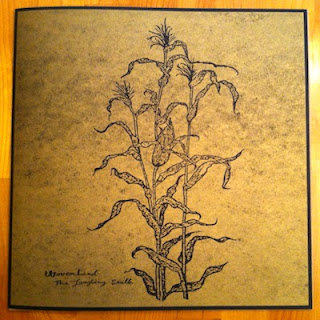to gather with the hand
The current mood says any philosophy is good as long as you don’t claim it to be true. Morally, people can believe whatever they want just as long as they don’t say their way is better. And while the term ‘religion’ receives its share of understandable baggage, what isn’t, is that you can subscribe to any religion you want and earn total immunity (especially if it has an Eastern flair) as long as the name of Christ isn’t mentioned...because that, just wouldn’t be 'tolerant'.
Since following David Eugene Edwards' solo project, Wovenhand, turn full-time band, I’m amazed at how the secular world qualifies what Edwards creates. Very rarely will his music be reviewed, but on the off chance it is, a reviewer seems to have difficulties actually focusing on Edwards’ music. Instead, he or she will have a discussion about their non-beliefs. At some point they will write, ‘despite being a fervent Christian, Edwards and the music he releases as Wovenhand, is actually worth checking into’. Well, thank you very little.
In the past two years, Edwards has released a book, live album, toured the US and Europe extensively, and as of last month, released his seventh studio album, The Laughing Stalk. It's hard to imagine anyone could be so prolific without either polarizing fans by releasing difficult material or duds. Instead, Edwards continues to hone in on his craft, making a strong case for getting better with age.
Since starting this project in 2002, with a self-titled release, Wovenhand albums continue to shift both musically and lyrically. Despite having a highly recognizable sound, no one Wovenhand record is a repeat. Blush Music (2003) was a reworking of Wovenhand and offered a window into Edwards' fascination with drones, sonic textures, and field recordings. Consider the Birds (2004) was more singular in it's sounds. Edwards' lyrics were glossed in Old Testament imagery and symbols, but the warnings he offered were anything but cryptic. On 'Chest of Drawers' he lamented, "the world will bow/and knees will be broken for those who don't know how." In 2006, Edwards released Mosaic, which was bent towards European Christian traditions, but also marked the first time Edwards didn't record all the instruments himself. He also began to pull from his background/interests in American Indian histories and chants. Ten Stones (2008) is arguably the cleanest and heaviest sounding Wovenhand release featuring a full band. Many of the albums ten songs (not counting the untitled bonus track) were an amalgam of sounds Edwards had explored in prior releases. Lyrically, Edwards could be heard as an apocalyptic prophet expressing his concern for the depravity in man. The Threshing Floor followed, being released in 2010, and was surrounded in a Eastern European/Middle Eastern flavor. The focus was more Christ-driven and yielded one of Edwards' greatest songs, the transcendent ‘His Rest’.
Edwards recorded The Laughing Stalk live in a studio with longtime drummer Ordy Garrison, Charles French on guitar (Git Some), Gregory Garcia on bass, and Jeremy Linsemeier on organ. The record was mixed by Alexander Hacke (Einstürzende Neubauten and Crime and The City Solution) and succeeds as a continuation of the electrical charge one receives at a Wovenhand show. The record's intensity is fixated on land blasting for nearly 43 minutes.
'King O' King' is a perfect example. The chorus, one of Edwards' finest, is a thunderous example of rushing of guitars, pounding toms, heart reviving bass, and cymbal crashes loud enough to crumble buildings. The only trouble with the band blazing on 11, is hearing Edwards' call. His voice isn't easily drowned out, but a hefty song like 'King O' King' comes close.
The Cramps-tinged opener, 'Long Horn', delivers Edwards' voice lifting the chorus, and makes the case for a great opener, but like the unfitting ending to The Threshing Floor (Denver City), the slight twang and silly/lazy lyrical content, are less Wovenhand and more reminiscent of 16 Horsepower's smirking folk (Edwards' former band).
Track two, 'The Laughing Stalk', successfully creates an echo with Edwards' voice, which helps it rise above the ramped up guitars, but he still sounds slightly distant. On the organ fueled 'In The Temple', Edwards' voice also sounds a tad too distant, which makes it difficult to connect the dots lyrically. However, the lyrics aren't just drowned out by the music, Edwards' spurts them out in rapid succession.
Of the nine well-named songs present on The Laughing Stalk, most are explicitly Biblical. Not that prior releases were any less 'scriptural' or 'God-filled', rather, more poetically attuned. The worshipful 'Coup Stick' is dangerously awkward. Of all the ways Edwards has given his allegiance to God, he has never been close to simply stating "God is great". It sounds too easy and dare I say boring coming from a wordsmith who inked "my kinsmen redeemer". Interestingly enough, the lyrics are not included on 'Coup Stick', rather a list of Jewish Kings.
The highlight of The Laughing Stalk isn't an intense, guitar blasting number, rather one built with a quieter, piano lead. 'Maize' starts with Edwards stating "Thoughts" while the melodic ting of piano keys and Garrison's sharp percussive rhythm weave while the band works in and out of Edwards' King James style verbiage. It's a staggering, hypnotic piece, placed well within the deep of The Laughing Stalk 's hearty rockers.
The album ends with the riff heavy, all-encompassing 'Glistening Black'. Drums build while guitars and bass wait to explode. The song capstones the untamed Laughing Stalk and sets the stage for the uncharted land and beasts Wovenhand encounter next time through.
Wovenhand tour. Bring a mitt to catch your jaw.




Comments
Post a Comment